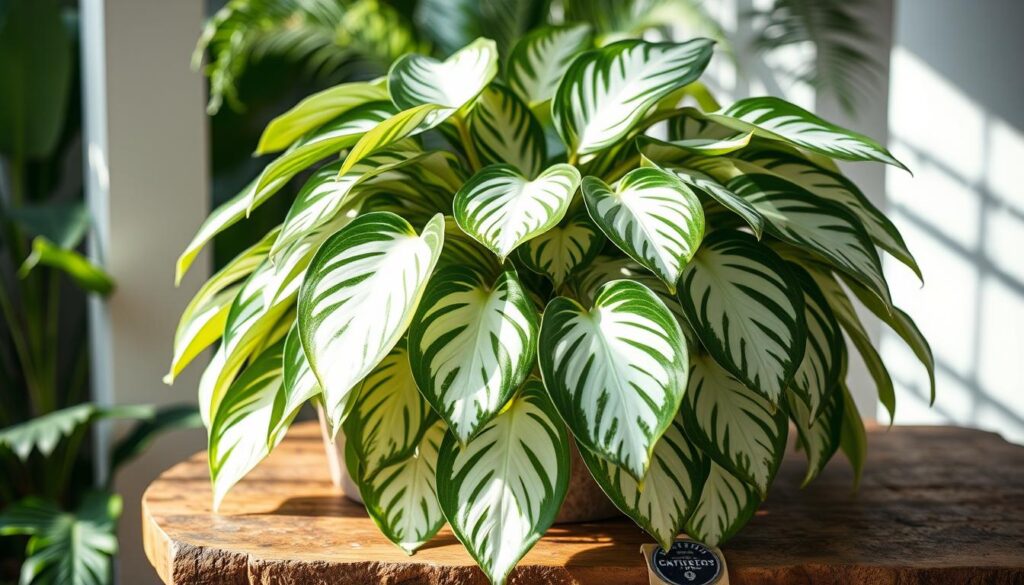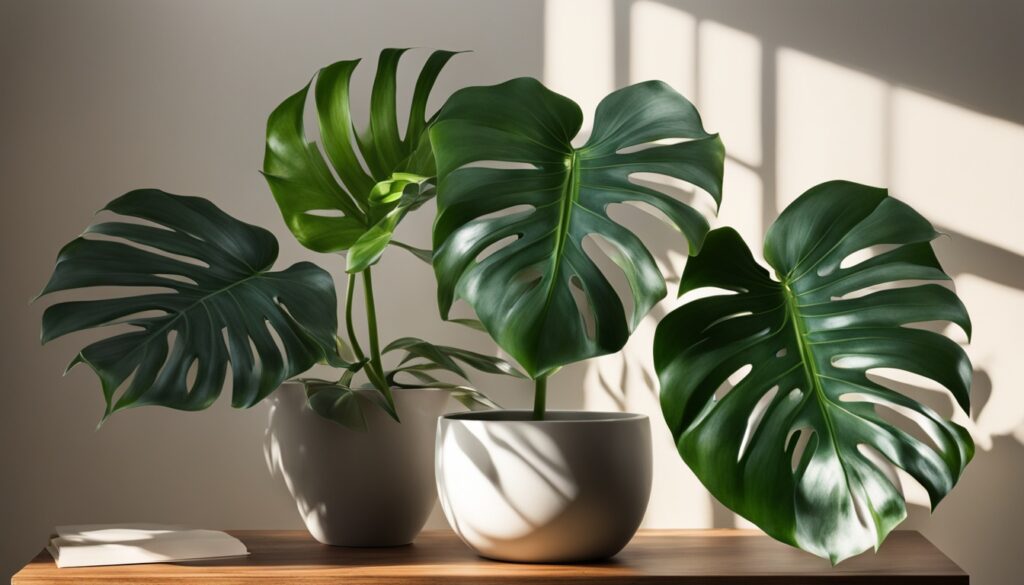Did you know the Philodendron ‘White Wizard’ is a top plant choice? Its white leaves grab the attention of plant fans everywhere. This indoor plant is not just pretty. It also cleans the air, making it a hit with snake owners and plant enthusiasts.
In this guide, we’ll cover the key care for the Philodendron ‘White Wizard,’ or White Snake Plant. We’ll talk about the best light, water, and soil for it. Plus, we’ll share tips on managing pests and diseases. This way, you’ll know how to keep your White Wizard happy and healthy indoors.
Key Takeaways
- The Philodendron ‘White Wizard’ is a low-maintenance, air-purifying indoor plant with striking white-variegated foliage.
- Proper lighting, watering, and soil requirements are crucial for the plant’s health and growth.
- Identifying and addressing common pests and diseases can prevent issues like yellow leaves.
- Establishing a consistent care routine is essential for the long-term thriving of the White Wizard snake plant.
- With the right knowledge and attention, the Philodendron ‘White Wizard’ can be a stunning addition to any indoor space.
Understanding the White Wizard Philodendron
The Philodendron White Wizard is a stunning tropical plant from Central and South America. It has large, glossy leaves with a white variegation. This makes it a favorite for indoor gardens and tropical plant care fans.
Species Origin and Natural Habitat
The White Wizard Philodendron comes from the tropical rainforests of the Americas. It loves humidity and warmth. In the wild, it can grow tall, climbing or trailing to find support.
Physical Characteristics
The Philodendron White Wizard has big, heart-shaped leaves. These leaves show off a beautiful variegation of green and white. It also has aerial roots for climbing and anchoring.
Growth Patterns and Expectations
The white wizard philodendron can grow quite large. It can reach several feet tall and wide. It likes to climb or trail, making it perfect for hanging baskets or moss poles.
“The Philodendron White Wizard is a stunning addition to any indoor garden, captivating with its unique variegation and lush, tropical appearance.”
Optimal Growing Conditions
The White Wizard Philodendron loves warm places like its natural home. It needs temperatures between 65-80°F (18-27°C), lots of humidity, and soil that drains well. Giving it the right philodendron care, indoor plant environment, and tropical plant requirements keeps it healthy and vibrant.
White Wizard Philodendrons need plenty of light but not direct sunlight. Direct sun can burn their leaves. The parts without chlorophyll are especially sensitive and need the right light to grow well.
| Optimal Growing Conditions | Requirement |
|---|---|
| Temperature | 65-80°F (18-27°C) |
| Humidity | High |
| Soil | Well-draining |
| Lighting | Bright, indirect |
It’s important to water White Wizard Philodendrons regularly but not too much. They like moist soil that drains well. Too much water can cause root rot, which is bad for the plant.
Finally, feeding them with a balanced fertilizer in spring and summer helps them grow strong and colorful. With the right philodendron care, a good indoor plant environment, and meeting their tropical plant requirements, your White Wizard Philodendron will flourish and add beauty to your home.
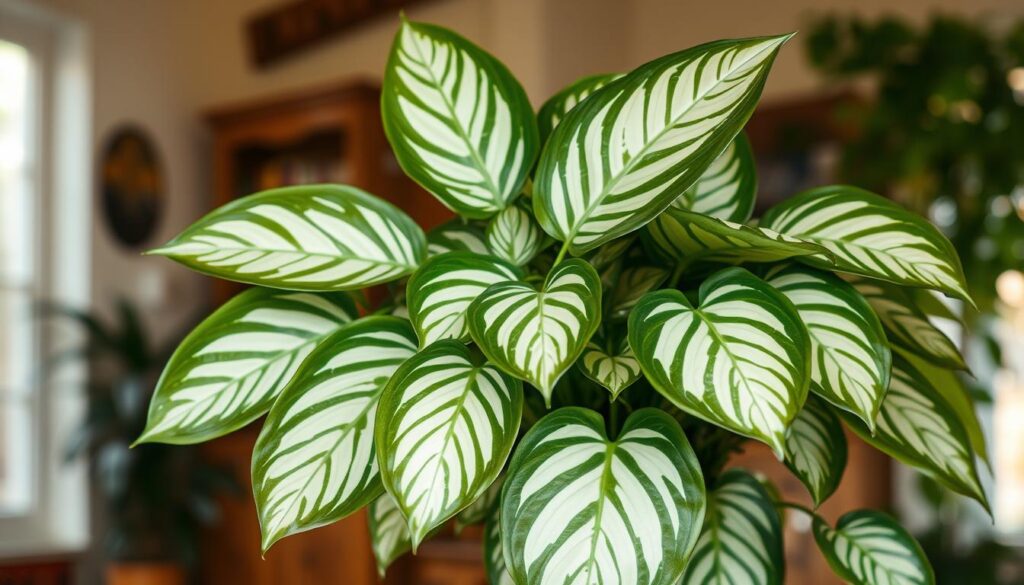
Light Requirements and Placement
The Philodendron ‘White Wizard’ loves bright, indirect light. Direct sunlight can burn its leaves. Not enough light makes the plant lose its bright colors.
It’s best to place it near a north or east-facing window. This way, it gets the right amount of philodendron light needs without getting damaged.
Seasonal Light Adjustments
Changing seasons mean adjusting the indoor plant lighting for your Philodendron ‘White Wizard’. In summer, it needs a bit of shade to avoid burning. In winter, move it closer to the window for more light.
Signs of Improper Lighting
- Yellowing leaves: A sign of too little light
- Leggy, stretched growth: Indicates the plant is searching for more light
- Loss of variegation: Insufficient light can cause the plant to lose its distinctive color patterns
Watch your Philodendron ‘White Wizard’ closely and adjust the light as needed. This way, it stays healthy, vibrant, and shows off its beautiful colors.
White Wizard Care: Temperature and Humidity
Keeping the right temperature and humidity is key for the Philodendron ‘White Wizard’ to thrive. This tropical plant loves a climate similar to its natural rainforest home.
Temperature Requirements
The Philodendron ‘White Wizard’ does best in temperatures between 60-80°F (15-27°C). If it gets too cold, below 55°F (13°C), it can suffer. This might cause leaves to turn brown, wilt, or grow slowly. Keeping the temperature steady is important to avoid stressing the plant.
Humidity Needs
The Philodendron ‘White Wizard’ needs a lot of humidity, around 60% or more. If it’s too dry, you might see browning leaves, no new growth, or yellow leaves. To fix this, use a humidifier, a pebble tray, or mist the plant often.
Adjusting to your local humidity is vital. Keeping plants together can help, but a dehumidifier might be needed in very humid places. Also, change humidity levels with the seasons to keep your plant happy.
By giving the Philodendron ‘White Wizard’ the right temperature and humidity, you’ll help it grow well. This ensures it stays healthy and vibrant.
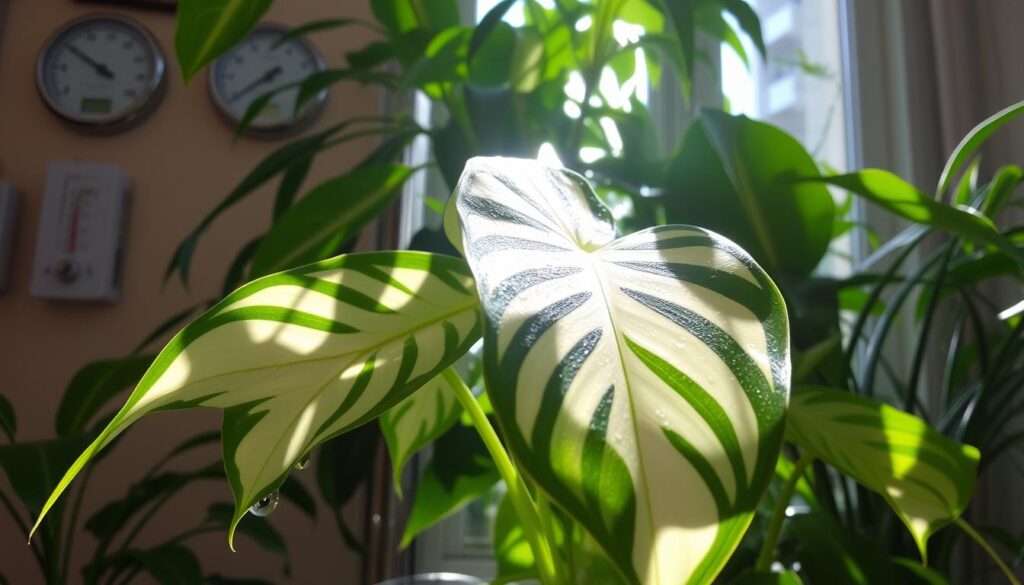
Watering Schedule and Techniques
Keeping the right philodendron watering schedule is key for your Philodendron White Wizard’s health and look. Water it when the top inch of soil feels dry. Use filtered water at room temperature to prevent mineral buildup and ensure the best indoor plant hydration.
Water Quality Requirements
The Philodendron White Wizard is very sensitive to water quality. Don’t use tap water because it has chlorine, fluoride, and other minerals that can harm it. Use filtered or distilled water instead to keep the plant healthy and prevent problems like leaf discoloration or slow growth.
Seasonal Watering Adjustments
- In spring and summer, water more often because the plant needs more water.
- In fall and winter, water less because the plant needs less moisture.
- Mulching the soil helps keep moisture in and reduces watering needs.
Water your Philodendron White Wizard twice a week, adjusting as needed for temperature, humidity, and pot size. Make sure to water properly to avoid root rot and never let the plant sit in water.
Soil and Potting Medium
For your White Wizard Philodendron, the philodendron soil mix is key. Use a potting medium that drains well and is rich in organic matter. A mix of peat moss, perlite, and orchid bark is perfect. It helps the roots grow well.
Choosing the right soil is vital for your White Wizard Philodendron’s health. The best mix is 60% potting soil, 20% peat moss, 10% perlite, 5% orchid bark, and 5% worm castings. This mix gives your plant the nutrients and moisture it needs.
Make sure your pot has drainage holes to avoid water buildup. Repot your White Wizard every 2-3 years or when it needs more room. This helps it grow and thrive.
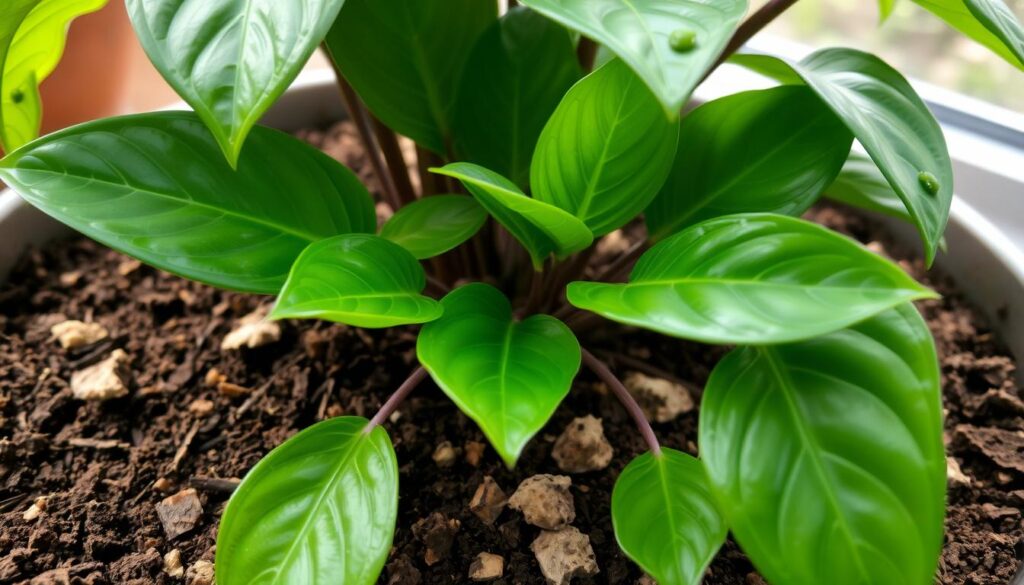
“The right philodendron soil mix is the foundation for a thriving White Wizard Philodendron.”
Choose a well-draining potting medium from a brand like Miracle-Gro or make your own. Either way, the right soil is crucial for your White Wizard’s success and growth.
Fertilization Guidelines
Feeding your White Wizard Philodendron is key for healthy growth and beautiful blooms. Use a balanced philodendron fertilizer with a 10-10-10 or 20-20-20 NPK ratio. This balanced plant food gives your philodendron the indoor plant nutrition it needs to flourish.
Types of Fertilizers
Choose a fertilizer made for philodendrons, whether organic or synthetic. Organic fertilizers like compost or fish emulsion release nutrients slowly. Synthetic fertilizers give a quick nutrient boost.
- Organic Fertilizers: Compost, worm castings, or fish emulsion
- Synthetic Fertilizers: Water-soluble 20-20-20 or 10-10-10 NPK formulas
Application Schedule
In spring and summer, feed your White Wizard Philodendron every 4-6 weeks with a diluted philodendron fertilizer solution. Cut back or stop in fall and winter when it grows less. Always follow the package instructions to avoid harming your plant with too much fertilizer.
| Season | Fertilization Frequency |
|---|---|
| Spring and Summer | Every 4-6 weeks |
| Fall and Winter | Reduce or stop |
By sticking to these fertilization guidelines, your White Wizard Philodendron will get the balanced plant food it needs. It will grow lush and produce vibrant blooms.
Pruning and Maintenance
Proper pruning and regular maintenance are key for your philodendron pruning, also known as the White Wizard Philodendron. This plant is easy to care for and adds elegance to any room. It also helps with improved indoor plant grooming and plant shape maintenance.
The best time to prune your White Wizard Philodendron is in spring or summer. Use the “20% Rule” – never cut more than 20% of the leaves at once. This prevents stress on the plant. You’ll need pruning shears, lopping shears, and hand saws for different sizes of cuts.
- Cut about 1/4 inch above the node to encourage new growth.
- Prune at the start of the growing season to prevent overgrowth and maintain the desired shape.
- Wait until the topsoil feels dry before watering the plant after pruning.
- Feed your White Wizard Philodendron with a balanced fertilizer every couple of weeks during the growing season.
Remember, the White Wizard Philodendron is toxic to pets and humans if eaten. So, be careful when grooming your plant.
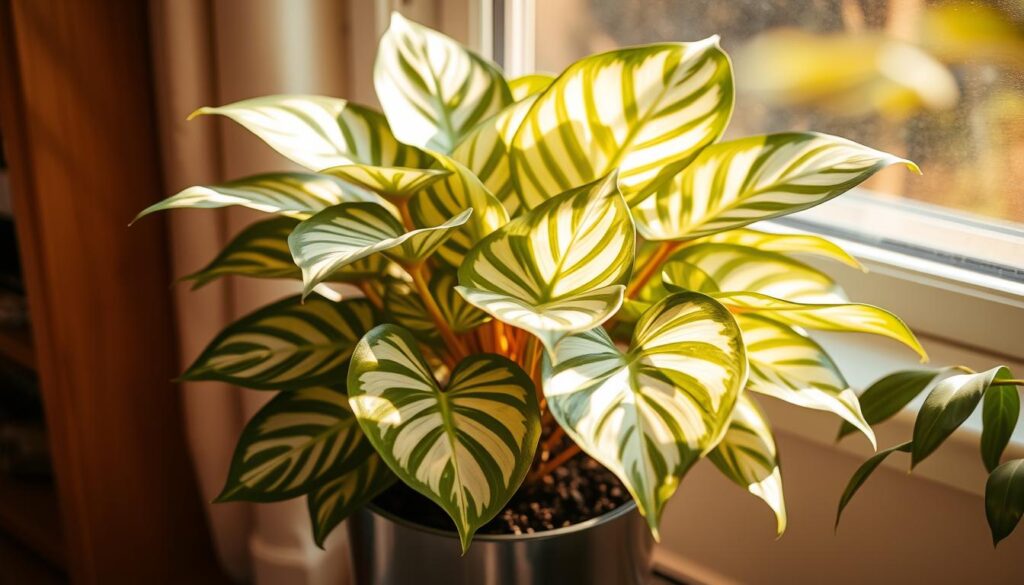
“Regular pruning and maintenance are the keys to keeping your White Wizard Philodendron healthy, vibrant, and true to its unique shape.”
By following these simple philodendron pruning and plant shape maintenance tips, your White Wizard Philodendron will stay beautiful and easy to care for in your home.
Propagation Methods
Propagating the Philodendron ‘White Wizard’ is rewarding. It lets you grow more plants or share this special variety. The best time to do this is in spring and summer when the plant grows fast.
Stem Cutting Technique
To start, pick a healthy stem with two to three leaves and nodes. Cut it just below a node with clean, sharp tools. Then, dip the cut end in rooting hormone to help roots grow.
Plant the cutting in moist, well-draining soil or sphagnum moss. Keep it moist and bright until it develops strong roots. This can take weeks to months.
Root Division Process
Root division is another good way to propagate the White Wizard Philodendron. Wait until it’s growing well, then carefully separate the roots. Make sure each section has healthy roots and at least one leaf or stem.
Plant each section in a pot with good drainage. Water well and keep it in a warm, humid spot with bright light. This method lets you make many new plants from one.
Always clean your tools before and after to avoid disease. Watch the temperature, humidity, and light to help your new plants thrive.
“Propagating the unique and visually striking White Wizard Philodendron is a gratifying way to expand your plant collection and share this remarkable specimen with others.”
Common Pests and Diseases
White Wizard Philodendrons can face many common pests like spider mites, mealybugs, and scale insects. It’s important to check the plant often for any signs of pests. Using insecticidal soap or neem oil can help fight these pests.
These plants can also get sick from diseases like root rot and leaf spot diseases. To avoid these, make sure to water them right and keep the air moving around them.
- Spider mites show up as tiny red dots and webs on the plant. They grow fast. To stop them, isolate the plant and cut off the affected parts.
- Scale infestations look like tiny, shell-like bumps on leaves and stems. To deal with them, you might need to prune, spray with water, or use insecticidal soap, isopropyl alcohol, Neem oil, or even throw away the plant.
- Fungus gnats and fruit flies can also bother plants. To keep them away, use traps, dry soil, beneficial nematodes, BTI, diatomaceous earth, and keep things clean.
- Mealybugs are easy to spot by their cottony tufts or powdery look. To get rid of them, isolate the plant, use rubbing alcohol, or ladybugs, and also try insecticidal soap, horticultural oil, and systemic insecticides.
| Pest | Identification | Treatment |
|---|---|---|
| Spider Mites | Tiny red dots and webbing on the plant | Isolate plant, prune infested areas, use water or neem oil |
| Scale Insects | Tiny, shell-like bumps on leaves and stems | Prune, use water spray, insecticidal soap, isopropyl alcohol, Neem oil |
| Fungus Gnats | Tiny flies around the plant | Use traps, dry soil, beneficial nematodes, BTI, diatomaceous earth |
| Mealybugs | Cottony tufts or powdery residue | Isolate plant, use rubbing alcohol, ladybugs, insecticidal soap, horticultural oil |
Keeping your White Wizard Philodendron clean and healthy is key. Quick action against pests and diseases is essential for its well-being.
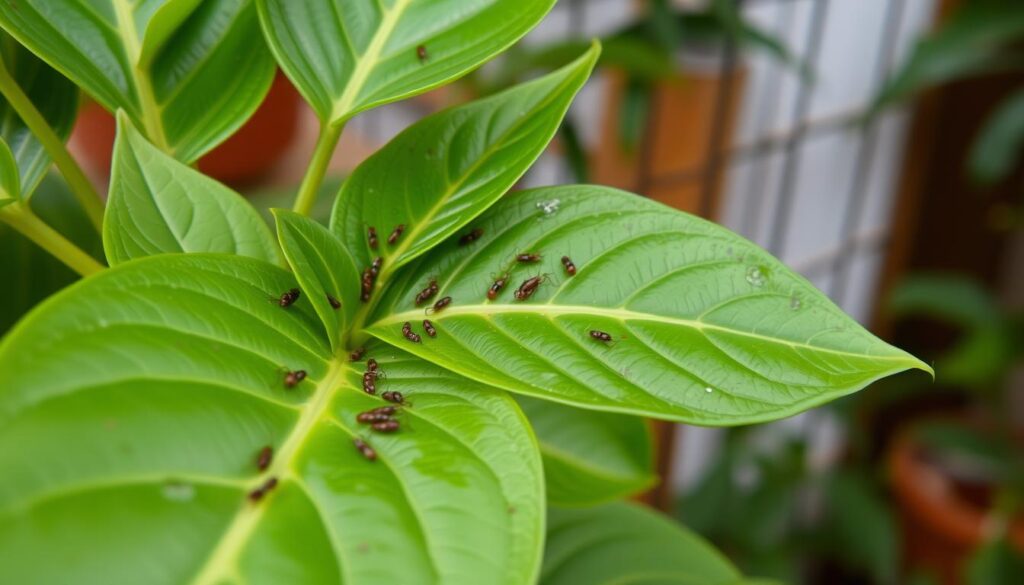
Growth Support and Climbing Structures
The White Wizard Philodendron needs support as it grows. It thrives with the right philodendron support and plant climbing structures. This helps it grow bigger and more impressive.
Trellis Options
A sturdy trellis is great for the White Wizard Philodendron. Trellises come in many styles, like wooden lattices or metal frames. Place them against a wall or stand alone. Guide the plant’s stems and roots to climb the trellis with soft ties.
Moss Pole Benefits
Moss poles are another good choice for moss poles for plants. They support the plant and keep moisture and nutrients right. The moss holds water, slowly giving it to the roots. This helps the plant grow well and get bigger leaves.
Choose the right plant climbing structures for your White Wizard Philodendron. Make sure to support it gently and give it space to grow. With the right support, this plant can grow tall and beautiful in your garden.
“Providing the appropriate philodendron support is crucial for the long-term health and beauty of your White Wizard Philodendron.”
Seasonal Care Adjustments
Keeping your Philodendron ‘White Wizard’ healthy means changing how you care for it with the seasons. In fall and winter, when it grows slower, water and fertilize less. This helps avoid overwatering and root rot.
As the days get shorter and colder, watch how much light your plant gets. Add extra artificial light if it’s not getting enough bright, indirect light. Keeping the humidity right is also key in dry winter air. Use a pebble tray or humidifier to help.
When spring and summer come, start watering and fertilizing again. Use a balanced, half-strength liquid fertilizer every 4-6 weeks to help it grow. Adjust how often you water based on how dry the soil gets. This prevents soggy soil that can cause diseases and pests.
